Despite calls from international rights groups for stronger action to stop the violence in Myanmar, there appears to be little appetite within the wider international community for more robust intervention, writes Lynn Kuok. Permitting the current crisis to unfold, however, eats away at its credibility and threatens peace and stability in Southeast Asia. This piece originally appeared in Foreign Affairs.
Over the past month, 436,000 Rohingya have fled from their homes in Myanmar’s western Rakhine State to neighboring Bangladesh. This is the second exodus of Rohingya, members of a Muslim ethnic minority, in the past year. The current exodus, like the previous one in October 2016 that led 87,000 to flee, is being driven by a brutal government crackdown following attacks by armed Rohingya.
Despite calls from international rights groups for stronger action to stop the violence, there appears to be little appetite within the wider international community for more robust intervention. Permitting the current crisis to unfold, however, eats away at its credibility and threatens peace and stability in Southeast Asia.
THE CURRENT CRISIS
On August 25, militants attacked 30 police posts and an army base in northern Rakhine State, killing ten police officers, a soldier, and an immigration official. Following this attack, the government designated the organization responsible, the Arakan Rohingya Salvation Army (ARSA), also known as Harakah al-Yaqin, a terrorist group.
Security forces have responded with indiscriminate force against the Rohingya community. They have razed entire villages to the ground and have killed, tortured, and raped civilians. The United Nations had previously described the October 2016 violence against the Rohingya as “very likely … crimes against humanity,” and on September 11 the U.N. High Commissioner for Human Rights, Zeid Raad al-Hussein, referred to the current situation as appearing to be “a textbook example of ethnic cleansing.”
The government of Myanmar (also known as Burma) has denied these accusations. In August, Vice President Myint Swe, the leader of a 13-member government commission tasked with investigating the events of last fall, insisted that “there is no possibility of crimes against humanity [and] no evidence of ethnic cleansing, as per U.N. accusations.” Instead, Myint Swe—a former chief of military intelligence—said that “people from abroad have fabricated news claiming genocide.” In the same vein, Myanmar’s de facto leader, State Counsellor Aung San Suu Kyi, said in a September phone call with Turkish President Recep Tayyip Erdogan that the “fake news” circulating about violence in the Rakhine State was “simply the tip of a huge iceberg of misinformation.”
The Myanmar government insists it is only targeting “terrorists.” Rohingya militants, however, numbered at most several hundred. With hundreds of thousands of Rohingya fleeing, many of them women and children, the government’s claim rings false. The U.N. estimates that children make up about 60 per cent of the Rohingya refugees in Bangladesh.
Although Myanmar has refused to allow international fact-finding missions into the country, groups including the UN, Human Rights Watch, and Amnesty International, which interviewed Rohingya refugees in Bangladesh, have documented atrocities committed by security forces. Recently the U.N. also highlighted disturbing reports of Myanmar authorities laying landmines along the Bangladesh-Myanmar border.
AUNG SAN SUU KYI SPEAKS
Amid growing international criticism of her handling of the Rohingya crisis, Aung San Suu Kyi, a former democracy activist and Nobel Peace Prize laureate, cancelled her attendance at the U.N. General Assembly last week. Instead, on September 19 she addressed the world in a televised speech from Myanmar’s parliament—her first national address on the situation in Rakhine State.
Aung San Suu Kyi’s speech delighted supporters and likely satisfied a domestic audience largely unsympathetic to the Rohingya, whom many Burmese consider illegal immigrants from Bangladesh and refer to as “Bengali” or, as Aung San Suu Kyi called them, “Muslims.” For foreign observers, the speech was not entirely negative—for instance, Aung San Suu Kyi invited representatives of the international community to visit Myanmar’s troubled areas to “see for yourself what is happening.” If she goes on to lift the heavy restrictions on the ability of international observers, the media, and aid workers to visit sensitive areas in Rakhine State, it will represent progress.
For those looking to Aung San Suu Kyi for leadership, however, her remarks were disappointing on several counts. First among them was her assessment of the situation on the ground. She asserted that since September 5, there have been no armed clashes and no clearance operations—a claim media and international rights organizations dispute. She also stated that the government wants to find out “why this exodus [of the Rohingya] is happening.” But if she and her government do not know, their ignorance can only be willful. In August, an advisory commission, led by former U.N. Secretary-General Kofi Annan and appointed by Aung San Suu Kyi herself, released its final report on the previous wave of violence in Rakhine State. The report stated unequivocally that “military and police operations” subsequent to militant attacks in October 2016 “led to tens of thousands of Muslims fleeing across the border to Bangladesh.” She should know that Rohingya are fleeing Myanmar today for precisely the same reason—only this time the crackdown is far worse as shown by the five-fold increase in those fleeing.
Next, Aung San Suu Kyi was careful to say that “it is not the intention of the Myanmar government to apportion blame or to abnegate responsibility.” Yet she went on to suggest that “loss of lives, injuries, burning of villages, and the displacement of peoples” is the fault of “armed Muslim groups” and their clashes with security forces, rather than (as is actually the case) a result of the security forces’ deliberate use of a scorched-earth policy.
Another problem with the address was Aung San Suu Kyi’s suggestion that the Rohingya crisis has deep roots and requires more time to resolve. She reminded the international community that Myanmar is a “complex nation” facing many challenges and that her government has only been in power for 18 months. No one begrudges the country time to sort out problems that have plagued it for decades. Indeed, countries such as the United States are seeking to help Myanmar build its capacity to address its underlying problems. It is also undeniable that relations between Rakhine Buddhists and Rohingya Muslims have been tense for years. This tension will take years, if not decades, to resolve—and even then only if the government puts the right policies in place.
Be that as it may, Aung San Suu Kyi’s comments conflated Myanmar’s long-standing problems—managing a democratic transition, ensuring peace and stability, and economic development—with a more recent one that is entirely of the government’s making. There are deep-seated tensions between the Rakhine and the Rohingya, but that is not what the current crisis is about. The current crisis is about Myanmar security forces committing mass atrocities. As a Nobel laureate and democracy icon, Aung San Suu Kyi should appreciate that such abuses cannot be tolerated and need to immediately be called out.
Finally, Aung San Suu Kyi asserted in her televised address that “all conflicts arise out of hate or out of fear. It is only by removing the sources of hate and fear that we shall be able to remove conflict from our world.” In a 2013 BBC interview, she similarly blamed conflict between Buddhists and Muslims on “fear felt by both sides.” Given recent events, it is difficult to avoid the unsettling conclusion that in her government’s eyes, conflict can only be removed by rooting out the source of fear: Muslims, including the Rohingya.
ONE VOICE
Some argue that Aung San Suu Kyi has not condemned Myanmar’s security forces because it would expose the limits of her power: the military still controls the key ministries of Border, Defense, and Home Affairs. Speaking out, they argue, would achieve little and might undermine her power base, potentially allowing the military to reassert control.
Aung San Suu Kyi, however, has not only simply failed to condemn the security forces. Her government has actively denied that they have carried out rapes and other abuses. It has also limited access to Rakhine State to foreign observers and aid workers. Taken together, her government’s actions suggest that Aung San Suu Kyi is broadly sympathetic to the security forces’ approach. In a development that has received little attention, the “State Counsellor’s Information Committee” Facebook page, which provides updates on the situation in Rakhine State, was renamed the “Information Committee” on August 29, just four days into the current crisis. According to Aung San Suu Kyi’s official spokesperson, the change was meant “to show the committee represents all the government—not just the state counsellor.” In other words, by her office’s own admission, the government is speaking with one voice on this issue.
The most charitable reading of Aung San Suu Kyi’s stance is that taking a stronger line against the security forces might hurt Myanmar’s democratic transition. But as the International Crisis Group recently made clear, it is precisely the government’s failure to address the violence that most threatens Myanmar’s fledgling democracy. Failure to speak out, even if it does not stop the violence, legitimizes the violations committed against the Rohingya and strengthens negative perceptions of them and of Muslims in general among Myanmar’s broader population. Radical Buddhist nationalists are using the crisis to fan the flames of anti-Muslim sentiment in the rest of the country. This could very quickly escalate into widespread anti-Muslim violence, as occurred in 2012 and 2013, which would be hugely destabilizing for Myanmar.
The violence in Rakhine State also hurts Myanmar’s international reputation. On September 13, the UN Security Council made its first statement on Myanmar in nine years, expressing “concern about reports of excessive violence during the security operations.” The crisis, moreover, has greatly eroded the international goodwill that Aung San Suu Kyi’s government has enjoyed since taking over in March 2016, and undermined Myanmar’s relations with majority-Muslim countries. Fellow Association of Southeast Asian Nations (ASEAN) states Indonesia and Malaysia, as well as Turkey and Pakistan, have condemned the violence in Myanmar. On September 19, Indonesia broke with ASEAN’s principle of non-interference to call for a resolution on Myanmar’s Rohingya crisis. (Given Myanmar’s objections, the resolution failed to pass.)
WAKING UP
As I have previously argued in Foreign Affairs, although some consider Aung San Suu Kyi a saint and recent developments have led others to brand her a sinner, she herself has only ever claimed to be a politician. The international community must help her recognize the political imperative of taking immediate action to address the violence in Rakhine State. Myanmar’s military, which considers itself to be the guardian of the nation, must also be made to see how its actions hurt Myanmar. The goal must be to ensure that the abuses stop, civilians can return to their homes, and access is restored for humanitarian workers and international observers.
Should persuasion fail, the international community must seriously consider stronger measures, such as targeted sanctions. Political and strategic factors, however, are likely to complicate the picture.
First, there is a pragmatic recognition among international observers that even a tarnished Aung San Suu Kyi might be the least bad option for Myanmar, given its history of conflict and military rule. That said, looking at the current situation in Rakhine State, one might be forgiven for thinking that an authoritarian and oppressive government, rather than a Nobel Peace Prize laureate, is at the country’s helm.
Another consideration, especially for the United States, is that a tough response might cede strategic influence to China, which is unlikely to pressure Myanmar over humanitarian concerns. Beijing is seeking to regain its previous foothold in the country and, as Sean Keeley argues in The American Interest, the crisis presents “an opening for Beijing to present itself as a helpful and nonjudgmental partner.”
Finally, there appears to be little appetite within the international community for more robust intervention. This explains why countries have not condemned the violence in terms used by international rights organizations: doing so might trigger moral and legal obligations. The international community, through the UN, has the responsibility to use appropriate diplomatic, humanitarian, and other peaceful means to protect populations from “genocide, war crimes, ethnic cleansing and crimes against humanity” and, where peaceful means are “inadequate,” to take collection action through the Security Council.
Notwithstanding these considerations, doing nothing is not an option in the face of an unfolding humanitarian crisis that eats away at the international community’s credibility and threatens regional and international peace and stability. The crisis stretches the capacities of neighboring countries ill-equipped to face the influx of refugees; undermines ASEAN unity, which could in turn destabilize Asia; deepens religious fault lines; and increases the risk of violent extremism.
In short, there are moral and interest-based imperatives for the international community to be more proactive in ensuring the violence stops. It needs to wake up to this fact and act accordingly.
The Brookings Institution is committed to quality, independence, and impact.
We are supported by a diverse array of funders. In line with our values and policies, each Brookings publication represents the sole views of its author(s).

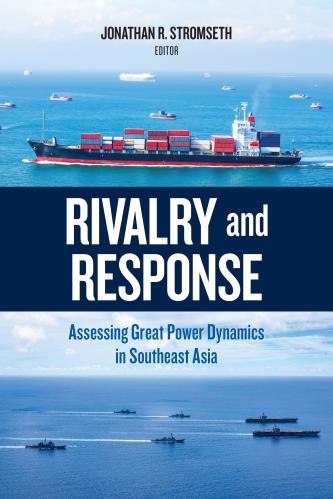

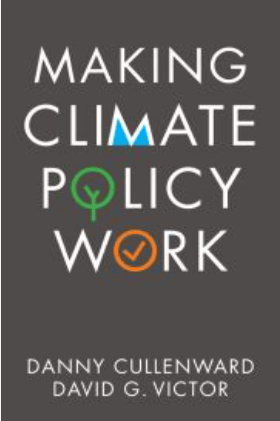
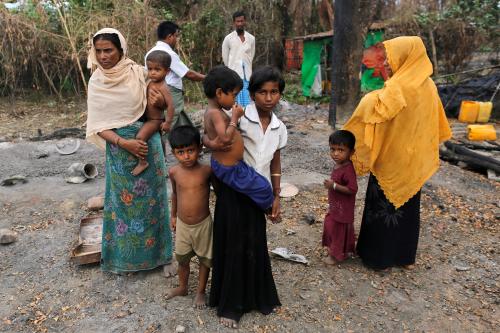
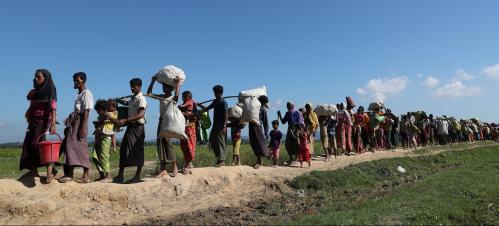
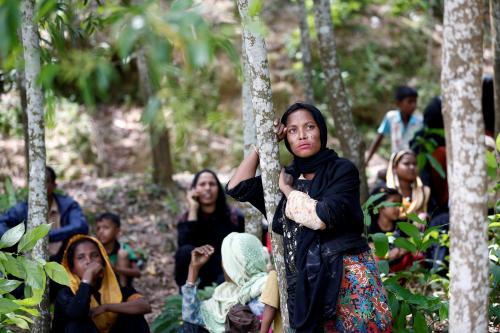


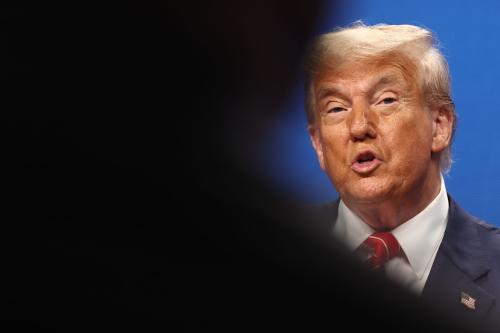
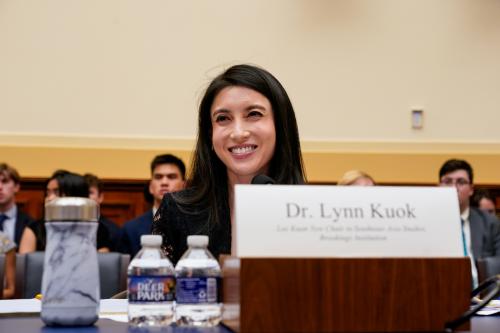
Commentary
While the world sleeps, Myanmar burns
October 4, 2017